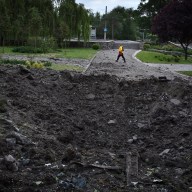Run-of-river power projects are touted as green energy. In reality, their impact on B.C.’s environment will vary from green to grey. Only appropriate oversight will ensure that run-of-river projects are good for the province.
The big benefit of run-of-river projects is that they provide electric power but produce little global-warming pollution.
Yet there are drawbacks. First, although they are also called micro-hydro, run-of-river projects are often not small. Most projects planned in B.C. are designed for export and too large to qualify as green energy elsewhere.
Second, such projects turn a public resource (a freely running river) into a private commodity. Why should only a few gain the benefits?
Third, when rivers are sold as power-producing natural capital, other values may be lost. Rivers and adjacent ecosystems support fish and wildlife, filter water, and provide a place for recreation; run-of-river projects may undermine those values.
To navigate these pros and cons, we need government oversight and public consultation. However, B.C.’s energy plan does not require Environmental Impact Assessments for run-of-river projects. And legislation does not allow citizens a voice on what should be done with their rivers.
Yes, we need power and we’d like to avoid climate change. But run-of-river power will not be green until industry and government see the big picture: Rivers are not just flowing water, but complex living systems replete with values for B.C.’s citizens.
Let them know
• Let your MLA know your priorities for rivers and power generation (contact info at leg.bc.ca)
– Kai Chan is an assistant professor and Canada Research Chair at the Institute for Resources, Environment, and Sustainability (IRES) at UBC. He’s a transdisciplinary environmental researcher, integrating ethics and social and natural sciences. Kirsten Harma is a Master’s student at IRES interested in how to balance multiple uses of water resources.
















